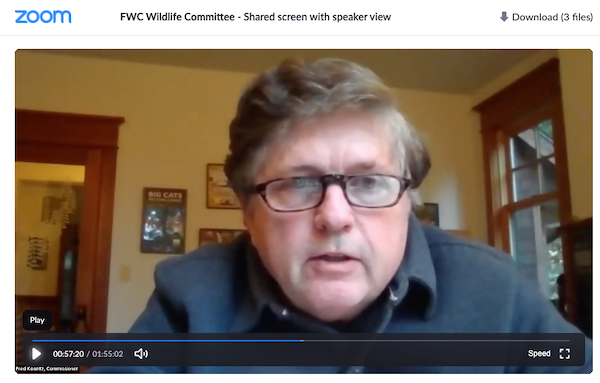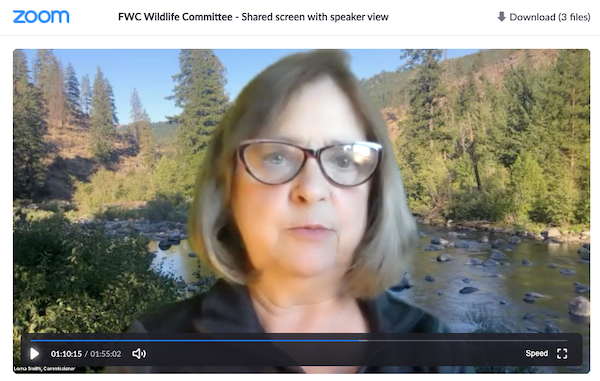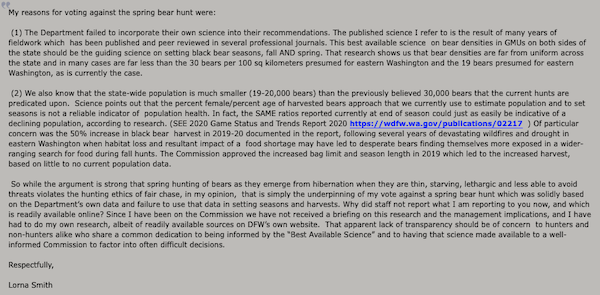
WDFW Commissioners Hear It From Hunters On Spring Bear, Blues Elk
Editor’s note: In other Washington Fish and Wildlife Commission news, the citizen panel reelected Larry Carpenter of Mount Vernon as the chair and chose Molly Linville of Douglas County’s Palisades as the new vice chair, both on 8-0 votes. Linville replaces Barbara Baker of Olympia, who nominated her as well as Carpenter.
Two Washington Fish and Wildlife Commissioners appear to have stepped in a steaming pile of elk and bear you-know-what with their recent thoughts on the Blue Mountain wapiti herd’s struggles and vote against the spring bruin hunt.
They heard about it from hunters and a tribal wildlife manager at this morning’s meeting of the citizen panel during public comment that had to be extended by the chair to two hours so many had signed up to speak.

Some of the most powerful – and possibly effective – testimony came from Tino Villaluz, the wildlife program manager for the Swinomish Indian Community by La Conner.
He took issue with Lorna Smith’s and Fred Koontz’s “wanton disregard of the wildlife profession” – his own.
The duo sided last month with overwhelming public sentiment based in no small part on emotions about the limited-entry 2022 spring black bear hunt over WDFW biologists, carnivore managers and the director, who recommended that it be approved and that it did not amount to a conservation concern for the bruin population at all.

And yesterday, after a briefing on the dire straits faced by the Blue Mountains elk herd that has has fallen to its lowest levels in 30-plus years and is not responding to sharply decreased antlerless tag levels, Smith and Koontz essentially argued, what crisis, let’s just lower the goalposts on the population objective and consider reducing hunting opportunities even further instead.
Villaluz, pointing to treaty hunting rights and necessary pragmatic wildlife management in the West’s smallest state with the second highest human population, said, “The arbitrary protection of predators cannot continue.”
He said that Smith and Koontz were showing “a heavy bias to first foods,” which he said for him is ungulates, and he said that it equated to “white privilege.”
Villaluz’s comments were echoed in part by Matthew Nesbitt, a Tri-Cities-area fisheries research biologist, who said the bear vote had shown disrespect for WDFW and that the commissioners should follow the science.
Nesbitt called bear a “favorite meat” with his family for its higher fat content, which can also be rendered into useful oil.
“I’d argue they’re not starving when they come out of the den in spring,” he said of bears.
Marc Alberts, who described himself as a “conservationist,” said halting the hunt amounted to a “loss of public trust” and an erosion of faith in objective wildlife management.
Bear hunter, bear hunting author and bear lover Douglas Boze also referenced the Blue Mountains elk herd in his comments to the commission.
“The decision to take away the spring bear hunt for 2022 has put our struggling ungulate population in specific areas under unnecessary pressure due to the increased predator population,” he said. “Being able to hunt bear in the spring during this vulnerable time for fawns and calves help to disperse the bear from birthing areas.”
Some groups and Smith claimed hunting bears in April was cruel and unethical because the animals were “lethargic” and starving, which for Smith “violates the hunting ethics of fair chase, in my opinion,” and served as the “underpinnings” of her no vote.
Numerous hunters took umbrage at the idea they were unethical, with Jon Dykes saying he’d felt “personally disrespected” by it. An enthusiastic north King County hunter/angler/outdoorsman, he invited his veritable neighbor, Koontz, as well as Smith et al to go on a cougar hunt with him.
Indeed, other hunters offered to take commissioners afield.
“We can show you what it’s like,” said Gabriel Garza, a hunter-nurse who took time out of his hunting trip to call in this morning.
Who’s to say if the commissioners will take up the invitation, but it all amounted to a fine showing by members of the Washington hunting community – even if it might have been better applied in October and early November before the vote and the danger it represented became crystal clear, though it was clearly being targeted from this time last year.
As the commission mulled over what they’d just heard, several members spoke up.
Kim Thorburn of Spokane, one of only two Eastern Washington representatives (technically there are supposed to be three but the third seat has gone unfilled by the Governor’s Office) and one of the four yes votes on spring bear, thanked Tino Villaluz, the tribal manager, for his thoughts.
“We forget that we comanage and there are really big cultural issues left out” of the debate, she said. “There are cultural issues that are really existential for our comanagers.”
Smith read into the record a statement she sent out explaining her vote.

Vice Chair Barbara Baker of Olympia, one of the four no votes, indicated it was difficult to hear from hunters that the commission’s decision had been based on emotions, and she said the “hard tacks” on fellow members – some called for Smith to resign from the panel – “didn’t sit well with me.”
She spoke to how, last December, the commission had promised to take a deeper dive into black bear issues ahead of the vote on the 2022 season, but hadn’t.
“We dropped the ball. We knew this was coming and we didn’t do a darn thing,” Baker said.
She also pointed to comments heavily against the hunt – “90 to 1,” she said.
“We are a public agency. We can’t ignore that kind of response when we have that discussion,” she said.
Baker claimed she believed everyone on the commission was a “strong supporter” of hunting and she pointed to the agency’s consumptive mandate.
But for her it all added up to an imperative to vote against the 2022 spring bear hunt.
“Because we dropped the ball and because we got thousands of comments from those who fund us, we didn’t have a choice,” Baker said.
That simply is debatable on So. Many. Levels.
And it contrasted sharply with the olive branch Chair Carpenter – the decisive fourth no – offered to Villaluz, to have a conversation outside the meeting.
And that, folks, is all the time I have for this morning’s exciting installment of What’s The Commission Up To Today?
Clarification, 2:35 p.m., December 3, 2021: Subsequent to publication of this blog, Vice Chair Barbara Baker reached out to me to say I’d misunderstood a portion of her statements in the 10th to last paragraph on the dropping of the ball – i.e., the promised deep dive into bear issues – specifically my wording, which reflected my judgment in the moment, that it amounted to a shifting of the blame to agency staff. “This is absolutely not the case,” Baker stated. “My point is and was that we, the Commission, dropped the ball. Not the staff.” My apologies and thanks for follow-up.
And my further apologies for all the tyops in the initial version of this.
